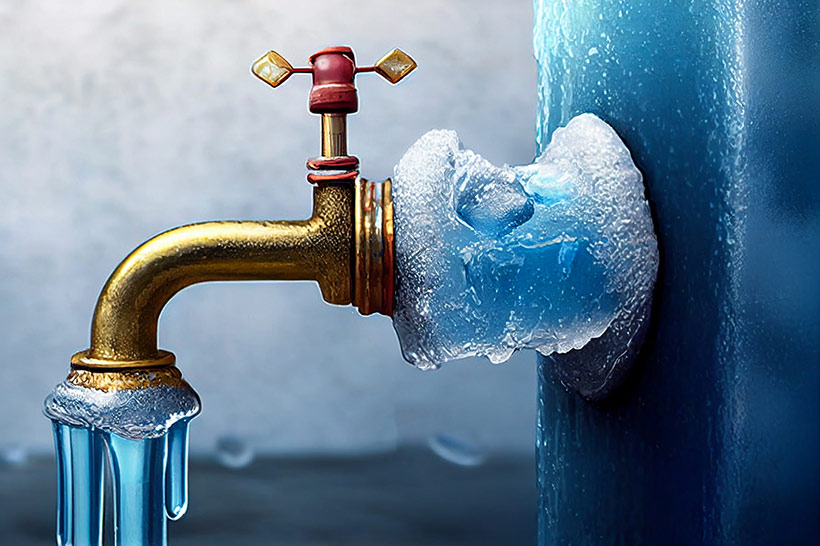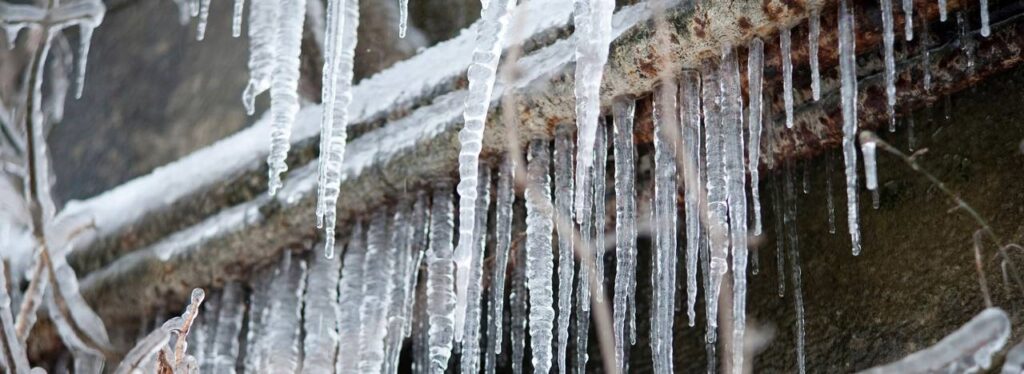Do you find yourself trying to locate insight involving Helpful Tips to Prevent Frozen Pipes this Winter?

Winter can damage your pipes, especially by freezing pipes. Below's how to avoid it from taking place and what to do if it does.
Intro
As temperature levels drop, the danger of icy pipes boosts, potentially bring about pricey repairs and water damage. Recognizing how to avoid icy pipelines is critical for homeowners in cold climates.
Prevention Tips
Insulating vulnerable pipes
Cover pipelines in insulation sleeves or utilize heat tape to secure them from freezing temperatures. Focus on pipelines in unheated or exterior locations of the home.
Heating methods
Maintain indoor rooms adequately heated up, specifically areas with plumbing. Open cabinet doors to allow cozy air to flow around pipelines under sinks.
Exactly how to recognize icy pipelines
Try to find lowered water flow from faucets, unusual smells or noises from pipes, and noticeable frost on subjected pipes.
Long-Term Solutions
Architectural modifications
Consider rerouting pipes far from outside wall surfaces or unheated locations. Include extra insulation to attics, basements, and crawl spaces.
Upgrading insulation
Invest in premium insulation for pipes, attics, and walls. Appropriate insulation assists keep consistent temperatures and lowers the risk of icy pipelines.
Safeguarding Outdoor Plumbing
Garden tubes and outside faucets
Disconnect and drain pipes yard pipes before wintertime. Set up frost-proof spigots or cover outdoor faucets with protected caps.
Recognizing Frozen Pipes
What causes pipes to ice up?
Pipes ice up when exposed to temperatures listed below 32 ° F (0 ° C) for prolonged durations. As water inside the pipelines ices up, it increases, taxing the pipeline wall surfaces and potentially creating them to rupture.
Dangers and damages
Icy pipelines can bring about water system interruptions, property damages, and pricey repairs. Ruptured pipes can flooding homes and cause extensive architectural damages.
Indications of Frozen Pipes
Recognizing frozen pipelines early can avoid them from breaking.
What to Do If Your Pipes Freeze
Immediate actions to take
If you think frozen pipes, keep faucets available to eliminate stress as the ice melts. Use a hairdryer or towels taken in hot water to thaw pipelines slowly.
Conclusion
Stopping frozen pipes calls for positive actions and quick reactions. By comprehending the reasons, indicators, and preventive measures, house owners can shield their plumbing throughout winter.
Helpful Tips to Prevent Frozen Pipes this Winter
UNDERSTANDING THE BASICS: WHY PIPES FREEZE AND WHY IT’S A PROBLEM
Water freezing inside pipes is common during the winter months, but understanding why pipes freeze, and the potential problems it can cause is crucial in preventing such incidents. This section will delve into the basics of why pipes freeze and the associated problems that may arise.
THE SCIENCE BEHIND FROZEN PIPES
When water reaches freezing temperatures, it undergoes a physical transformation and solidifies into ice. This expansion of water as it freezes is the primary reason pipes can burst. As the water inside the pipe freezes, it expands, creating immense pressure on the walls. If the pressure becomes too great, the pipe can crack or rupture, leading to leaks and water damage.
FACTORS THAT CONTRIBUTE TO PIPE FREEZING
Low Temperatures: Extremely cold weather, especially below freezing, increases the risk of pipes freezing. Uninsulated or Poorly Insulated Pipes: Pipes located in unheated areas, such as basements, crawl spaces, or attics, are more prone to freezing. Insufficient insulation or lack of insulation altogether exacerbates the problem. Exterior Wall Exposure: Pipes running along exterior walls are susceptible to freezing as they encounter colder temperatures outside. Lack of Heating or Temperature Regulation: Inadequate heating or inconsistent temperature control in your home can contribute to frozen pipes. PROBLEMS CAUSED BY FROZEN PIPES
- Pipe Bursting: As mentioned earlier, the expansion of water as it freezes can cause pipes to burst, resulting in significant water damage.
- Water Damage: When pipes burst, it can lead to flooding and water damage to your property, including walls, ceilings, flooring, and personal belongings.
- Structural Damage: Prolonged exposure to water from burst pipes can compromise the structural integrity of your home, leading to costly repairs.
- Mold and Mildew Growth: Excess moisture from water damage can create a favorable environment for mold and mildew growth, posing health risks to occupants.
- Disrupted Water Supply: Frozen pipes can also result in a complete or partial loss of water supply until the issue is resolved.
WHY CERTAIN PIPES ARE MORE PRONE TO FREEZING
- Location: Pipes located in unheated or poorly insulated areas, such as basements, crawl spaces, attics, or exterior walls, are at higher risk of freezing.
- Exterior Pipes: Outdoor pipes, such as those used for irrigation or exposed plumbing, are particularly vulnerable to freezing as they are directly exposed to the elements.
- Supply Lines: Pipes that carry water from the main water supply into your home, including the main water line, are critical to protect as freezing in these lines can affect your entire plumbing system.
- Underground Pipes: Pipes buried underground, such as those connected to sprinkler systems or outdoor faucets, can be susceptible to freezing if not properly insulated.
https://busybusy.com/blog/helpful-tips-to-prevent-frozen-pipes-this-winter/

As an enthusiastic person who reads on How to prepare your home plumbing for winter weather, I think sharing that segment was sensible. Sharing is good. You never know, you may be doing someone a favor. I take joy in reading our article about Preventing and dealing with frozen pipes.
Book A Service